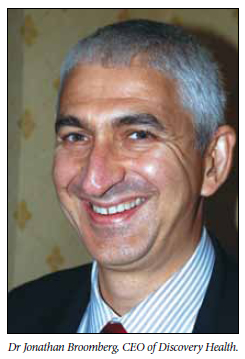Serviços Personalizados
Artigo
Indicadores
Links relacionados
-
 Citado por Google
Citado por Google -
 Similares em Google
Similares em Google
Compartilhar
SAMJ: South African Medical Journal
versão On-line ISSN 2078-5135
versão impressa ISSN 0256-9574
SAMJ, S. Afr. med. j. vol.101 no.11 Pretoria Nov. 2011
IZINDABA
Stabilise medical schemes, reduce NHI patient burden - discovery

Smarter solvency legislation and urgently revisiting the creation of a risk equalisation fund would enable private medical schemes to help a budding NHI shoulder patient burdens when most needed, Discovery Health's CEO, Dr Jonathan Broomberg, says.
Broomberg, a former co-chair of a pivotal government committee of enquiry into health reforms in 2007, told the Hospital Association of South Africa (HASA) conference last month that stabilising the medical schemes environment would support the successful emergence of an NHI. Illustrating his urgent call for a risk equalisation fund (REF), he said the top 2% of his company's members accounted for half of Discovery's annual expenditure. 'That's about 26 000 people carried in a stable risk pool of 2.3 million people. We can handle it, but it can be a real problem for a smaller medical scheme - that's why we need a REF.'
His company, the country's biggest medical aid, had seen a three-fold increase in the use of expensive medical interventions over the last decade (from 15 per 10 000 to 45 per 10 000 members claiming about R50 000 per annum). This was due to the 'explosion' of new drugs, procedures and technology and the 'wave' of disease incidence and prevalence. Without the creation of an REF, more small medical schemes would collapse, leaving patients vulnerable. (A risk-adjusted capitation based on the size of the registered population, epidemiological profile, target utilisation and cost levels was proposed for medical schemes for the REF, but not implemented.)
Broomberg said too much NHI emphasis was being placed on tariffs for doctors and hospitals, most of the former being underpaid and the latter being 'reasonably' paid.
Greater definition was also needed in the NHI Green Paper (which provided a 'sensible' broad framework but raised questions about implementation), on what the entitlements were for prescribed minimum benefits (PMBs). He said the current solvency requirements for medical schemes were far too rigid, requiring Discovery to hold R8 billion in reserves in its very stable financial environment while putting a huge burden on smaller schemes. 'We are over-capitalised by a factor of two to one. We think the right solvency level is 10% or 11%,' he added.
'If you allow private medical schemes to collapse you will burden the NHI when it least needs it (the initial stages). Keep those people covered and keep them away from demanding services from the NHI. Later on when the NHI is more robust, bringing them on [board] would make more sense'.
Help us to help you - Broomberg
Enhancing private health care was not mutually exclusive of an NHI. 'We have assets and expertise both on funding on the delivery side which, if properly harnessed, could significantly enhance the prospects of a successful NHI system,' he added.
Welcoming the extension for public comment on the NHI Green Paper to the end of this year, Broomberg said the future shape of private medical aids would be defined by how well the impending universal health coverage 'pans out.' His 'most likely scenario' has existing private medical scheme environment continuing as far into the future 'as we can plan to provide comprehensive cover alongside the NHI', with some private flexible top-up cover emerging.
Some members would migrate to the NHI and buy top-up cover privately, but this was heavily dependent on how well the NHI performed after the total re-engineering of the public health care sector and an overhaul of current dysfunctional facilities.
Punting himself as an optimist who wanted the NHI to succeed, Broomberg said he hoped for significant expansion in coverage and quality by the public sector which would place it on a competitive footing with the private sector in 10 - 15 years. 'In a world that looks like that we'll find products and services by adapting and building around the NHI. If we can't adapt we don't deserve to be in business. We don't want to thrive because of public sector failure,' he said.
Dr Okore Okorafor, a health economist at the MediClinic Group, said his calculations had shown that assuming little or no change in the quality of care in the public sector, an NHI tax would result in a 0.73% reduction in demand for private health insurance.
The public sector issue was not so much about money but 'how we use it'. Glaring omissions in the Green Paper included accountability, transparency and systemic challenges to improving quality of care. 'All it says is there must be an overhaul of the management system.'
Okorafor said the lack of management capacity and accountability, severe shortage of health care professionals, poor disciplinary procedures and corruption, as well as delayed responses in the public sector, all affected quality negatively. The lack of independence of the Office of Health Standards and Compliance would also severely hamper its ability to regulate quality, he added.
Chris Bateman
chrisb@hmpg.co.za














